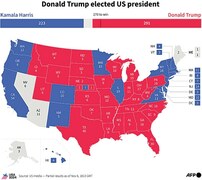In a surprising twist on the political stage, a White House win offers former President Donald Trump a much-needed legal reprieve. With a history of legal challenges ranging from tax investigations to alleged involvement in January 6 events, Trump’s return to power could alter his legal landscape significantly. As he gears up for another potential term, many wonder how a victory might shift the focus away from his legal issues, granting him temporary relief and changing his position in the eyes of the law. This article explores how a White House win could give Trump a legal reprieve, the likely implications for ongoing cases, and how it could impact his future.
How the White House Win Gives Trump a Legal Reprieve
A second period inside the White House might grant Trump the energy to influence each federal investigation and the tempo of prison proceedings. Many of Trump’s felony battles are tied to federal cases, which means that he should leverage govt powers to stall or maybe push aside investigations. The Justice Department, for example, falls below the govt branch, and Trump could appoint allies in key positions to supervise or doubtlessly slow down certain cases.
By regaining the Oval Office, Trump may also revel in what’s referred to as “presidential immunity.” While this doesn’t supply total immunity from all charges, it provides sizeable protections towards prosecution even in the workplace. This factor is crucial in understanding how the White House win gives Trump a legal reprieve and helps him navigate the complexities of ongoing legal scrutiny.
The Impact on Federal Investigations and State Cases
While a go back to the White House would truly help Trump with federal investigations, it’s a one-of-a-kind story for state instances. Some of the best-profile cases towards him are state-degree investigations, such as the probe into his enterprise dealings in New York and the election interference case in Georgia. For these instances, presidential immunity is no longer observed, this means that Trump might nevertheless need to answer for his movements in those states no matter his position as president.
That said, a White House win does provide strategic power. Trump’s legal team could argue for delays or even attempt to bring cases to federal court, claiming that they are matters of national interest. This tactic could buy him time and create a more favourable legal landscape. So, while the White House win gives Trump a legal reprieve on the federal front, state cases remain a significant hurdle.
Watch on YouTube: Trump’s Legal Battles and Presidential Immunity
White House Win Gives Trump a Legal Reprieve but Raises Ethical Questions
The question of whether or not a sitting president ought to have immunity from prosecution is an extended-standing debate. When a White House win offers Trump a prison reprieve, it raises ethical and criminal questions about the volume of presidential powers. Many argue that if a president is immune from prosecution whilst in office, it may encourage unlawful movements, undermining the responsibility of the best office inside the land.
Critics endorse that this form of reprieve would set a risky precedent. Granting legal immunity quickly could encourage future presidents to prioritize personal interests over the state’s welfare. However, Trump’s supporters argue that he’s being unfairly targeted by using criminal cases meant to derail his political comeback. In their view, his reelection would be a vindication, justifying the reprieve as a reaction to politically influenced investigations.
How Presidential Power Shields Leaders
Looking at history, U.S. presidents have occasionally used their powers to safeguard themselves and their allies. Despite Nixon’s efforts to avoid the Watergate investigation, it led to his resignation. Bill Clinton faced impeachment lawsuits but finished his term due to legal protections for presidents.
The White House win grants Trump a legal shield, highlighting the power’s protective influence amidst scrutiny. Presidential immunity aims to prevent interference but sparks problems. It may help Trump delay or deflect cases, offering a temporary legal sanctuary.
Watch on YouTube: Presidential Immunity and Legal Ramifications
Implications for Future Presidential Accountability
If a White House win gives Trump a legal reprieve, it could reshape the way presidential accountability is perceived. Future presidents might look to his example, using the office as a shield against personal legal challenges. Elected leaders being seen as above the law while in office could erode public trust in government. The implications go beyond Trump, influencing future administrations’ handling of legal scrutiny and leaders’ standards.
Additionally, Trump’s possible return to the presidency may spark renewed debates about the need to reform laws around presidential immunity. Some prison experts endorse stricter pointers to save any president from the usage of the workplace to evade regulation. Supporters claim it enhances government transparency, accountability, and equal standards for all.
In the end, the scenario provides a tough question for America: Should a president be immune from prosecution? Trump’s legal journey could prompt new laws or policies to balance governance effectiveness with accountability, keeping leaders accountable.
Potential Outcomes: A Lasting Legacy or More Legal Trouble?
If Trump wins the presidency, it could provide legal relief but doesn’t ensure a fresh start. Even with presidential immunity, he may face intensified scrutiny after leaving office, potentially leaving him with unresolved legal matters. In this way, Trump’s legal challenges could continue to follow him, and a second term might only delay the inevitable.
The implications for Trump’s legacy are also at stake. Supporters view his acquittal as resilience; critics condemn it as a misuse of power. Winning the White House could impact how Trump is remembered in history, affecting his legal situation and governance.
